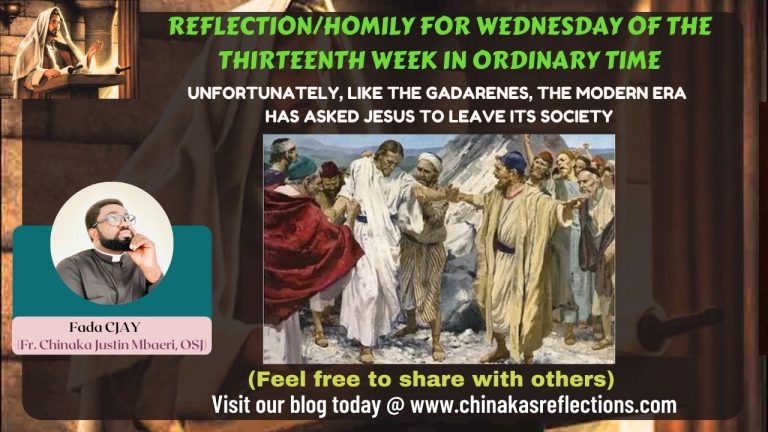UNFORTUNATELY, LIKE THE GADARENES, THE MODERN ERA HAS ASKED JESUS TO LEAVE ITS SOCIETY
First Reading: Genesis 21:5,8-20
Responsorial Psalm: Ps. 33(34):7-8,10-13
Gospel Reading: Matthew 8:28-34
_______________________________________
In the diverse labyrinth of human history, the 21st century stands as a unique chapter, marked by rapid progress, technological advancements, and profound societal transformations. Yet, in the midst of this era of enlightenment, we find ourselves pondering the state of our relationship with the divine. It is a reflection that calls us to explore the ways in which modern man has, perhaps, driven Jesus away from society, schools, homes, and families. That is to say, our modern era, with its rapid advancements and evolving societal norms, has unfortunately witnessed a gradual shifting away from the foundations that once upheld Christian values. Thus, one cannot deny that a shift has occurred. Christian education, once a cherished cornerstone of society, seems to have gradually faded away in most developed countries of the world. The Bible, a timeless source of wisdom and guidance, has been removed from educational institutions on the grounds of being outdated or irrelevant. These actions signify more than just the removal of a book; they represent a departure from the principles and values that shaped our moral compass for centuries. As a result, leaving a void that secular ideologies may seek to fill casting a growing acceptance of practices and lifestyles that challenge traditional Christian teachings. This displacement of Jesus from our societal landscape can also be contemplated in the “expulsion” of Jesus from the territory of Gadarenes as seen in today’s gospel reading.
Beginning with the Gospel Reading from Matthew (8:28-34), Jesus performed a miraculous act of healing by expelling demons from two possessed men. Instead of embracing this transformative act, the people of Gadarenes asked Jesus to leave their territory. They were more concerned with the loss of their livelihood, their pigs, than they were with the life-changing miracle that had taken place before their eyes. By so doing, they disregarded the human dignity of their demoniac brothers who had been liberated by Jesus and raised the dignity of their animals. In drawing this parallel, we must reflect on our own lives. Have we, too, become so engrossed in the material aspects of our existence that we have disregarded the spiritual realm? Are we more concerned with our immediate comforts and desires than with cultivating a deeper connection with the divine? Is our society more concerned with the preservation and the protection of the lives of animals than human lives, as seen in cases of legalized abortion, the increase in the care of animals while many human lives in the streets seem to go into extinction every day resulting from less care, etc?
Turning our gaze to the First Reading (Genesis 21:5,8-20), we witness the story of Hagar and her son Ishmael. Hagar, who was Sarah’s maidservant, bore a child with Abraham named Ishmael. However, tensions arose within Abraham’s household, leading to Hagar and Ishmael being sent away into the wilderness. When they ran out of water and were on the brink of despair, God heard their cries and intervened. He provided a well, sustaining their lives and promising to make Ishmael into a great nation. When we juxtapose this reading with the Gospel reading, we see the varied responses of human beings to the presence and power of God. While Hagar and Ishmael recognized and acknowledged God’s intervention in their lives with gratitude, the people of Gadarenes responded with fear and discomfort, asking Jesus to leave their region.
Unfortunately, the tragedies of abortion and the complexities surrounding issues of human sexuality have become matters of contention and moral ambiguity, clouding the once-clear vision of God’s divine plan. These societal shifts reflect a widening gap between contemporary values and the teachings of Jesus, causing some to lose sight of the profound spiritual richness that can be found in embracing His wisdom. Yet, even amidst this landscape of change and upheaval, there remains hope. For in the very darkness that obscures His presence, the light of Jesus persists, illuminating hearts that seek Him earnestly. It is within our own lives, our families, and our communities that we can choose to rekindle the flame of faith and invite Jesus back into our midst.
Dear friends in Christ, as we navigate the complexities of the 21st century, let us not despair but rather rise to the challenge of rekindling our relationship with Jesus. Let us remember that the transformative power of Jesus is not limited to the walls of institutions or the structures of society. It is within the human heart that His message finds its true dwelling place. Each of us, as individuals, has the capacity to bring about change and revival by embracing the love and teachings of Jesus. By allowing His light to shine through us, we become catalysts for a renewed awareness of His presence, enabling others to experience His boundless grace and mercy. Let us become agents of transformation in our communities, embodying His love and compassion. By doing so, we can inspire others to seek the timeless truths found within the pages of the Bible and rediscover the transformative power of a life intimately connected to Jesus. Inasmuch as the modern era seems to ask God to depart from society, may the good Lord not depart from us, may He not leave us desolate; for cut off from Him, we can do nothing. May the Lord continue to bless His words in our hearts, through Christ our Lord. Amen.
(CLICK HERE FOR THE NEXT DAY’S REFLECTION: REFLECTION/HOMILY FOR THURSDAY OF THE THIRTEENTH WEEK IN ORDINARY TIME)
Shalom!
© Fr. Chinaka Justin Mbaeri, OSJ
Paroquia Nossa Senhora de Loreto, Vila Medeiros, São Paulo, Brazil
nozickcjoe@gmail.com / fadacjay@gmail.com
__________________________
Have you prayed your rosary today?



May we not cut off from God because of materials things of the world in Jesus name i prayed Amen